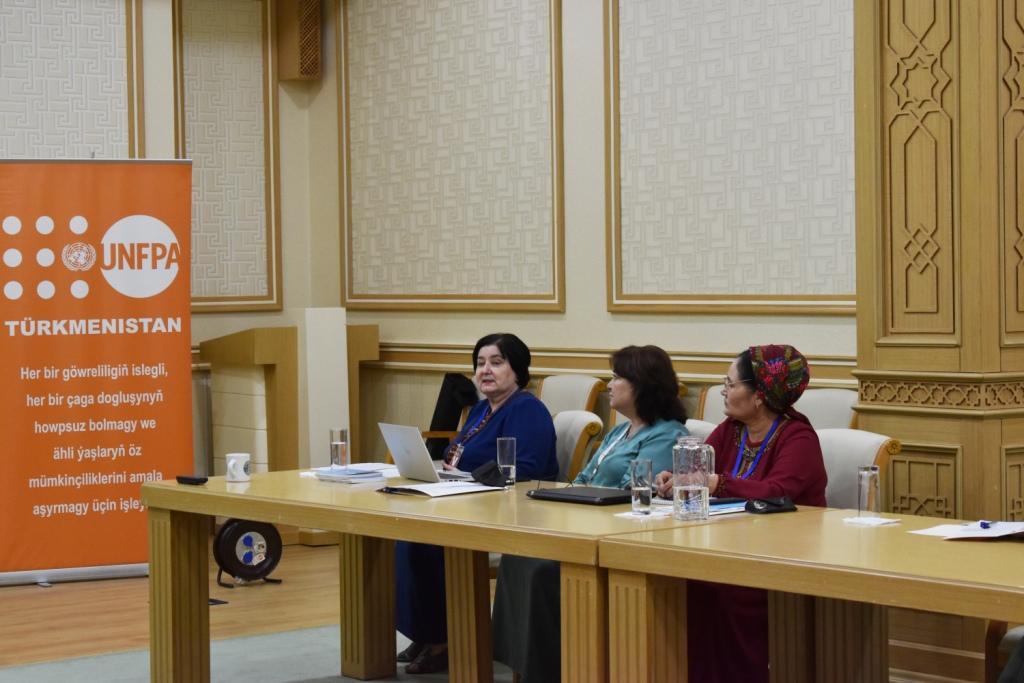The National Institute of State, Law and Democracy of Turkmenistan jointly with the Women Union of Turkmenistan, UNFPA, the United Nations Population Fund and OSCE, the Organization for Security and Co-operation in Europe launched the countrywide round-tables to monitor the implementation of the National Action Plan on Gender Equality (NAPGE) in Turkmenistan for 2021-2025.
Key national experts sensitized the government, local administration, law enforcement and public organizations representatives on many aspects of gender equality, international obligations of Turkmenistan on gender equality and Concluding observations of CEDAW, the Convention on Elimination of All Forms of Discrimination against Women, as well as the mechanisms of monitoring of the National Action Plan on Gender Equality.
“The Government of Turkmenistan adopted the second National Action Plan for Gender Equality for 2021-2025,” said Ms. Shemshat Atajanova, Representative of the Institute of State, Law and Democracy. “The NAPGE is a comprehensive policy document, which identifies national goals, objectives, and priorities to continue advancement in the realization of gender equality in all spheres of people’s lives at national and local levels.”
The National Action Plan was developed with the support of UNFPA. It builds on the Concluding Observations of the UN Committee on the Elimination of Discrimination Against Women, other international human rights obligations relating to gender equality, the assessment results of the first NAPGE for 2016-2020, and relevant SDG goals and targets linked to gender equality committed to by the Government.
The seven strategic areas of new NAPGE include further enhancement of the legislation, ensuring gender-responsive healthcare, fostering equal access to education, prevention and response to gender-based violence, economic empowerment of women and girls; advancing women’s participation on all levels, including the political and social dimensions. The Plan takes into account the socio-economic impact of the global pandemic on women and girls and outlines the measures to ensure that no one is left behind, including young girls and women with disabilities.
The NAPGE for 2021-2025 will be implemented by state and local authorities with involvement of research institutions, civil society organizations, UN Agencies, other international organizations, as well as women and young people.
The lively discussions covered the issues of economic rights and opportunities of women, with focus on rural and vulnerable women, reproductive health and rights, best practices in engaging men and boys in advancement of gender equality and prevention of gender-based violence, and the role of public organizations in promoting gender equality in Turkmenistan.
In the course of the round table discussions, the participants asked relevant questions, provided feedback and comments to the work that is being carried out in the country, and made suggestions for improving the current practices on promoting gender equality in the country.
In particular, participants noted the importance of a multisectoral approach and involvement of the state and public organizations at the government, community and individual levels in the work to advance on gender equality. More discussions, education, campaigns were suggested on the issues of gender equality, overcoming stereotypes and prevention of gender-based violence to be incorporated in the work plans of different organizations targeting different groups. Promotion of family values, equal partnership and inclusive opportunities for women and girls as well as men and boys were noted to be the key in achieving gender equality.
For more information, please contact:
Mehri Karakulova,
National Programme Officer on Gender and Youth
Ene Tuyliyeva,
Youth and Communications
www.instagram.com/unfpa_turkmenistan
imo: +99362 833158


